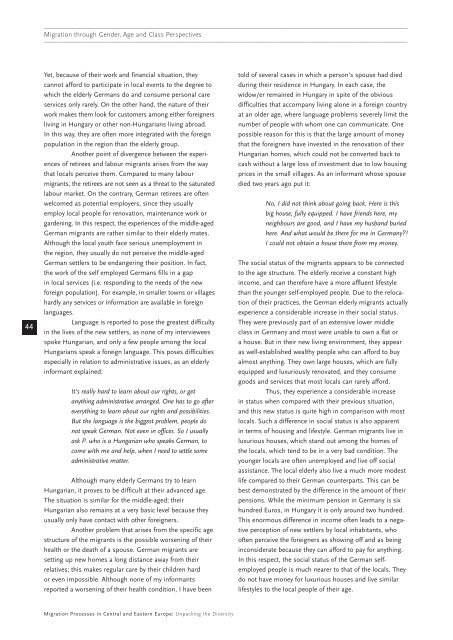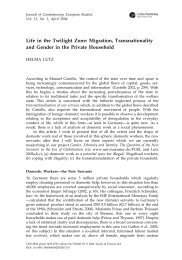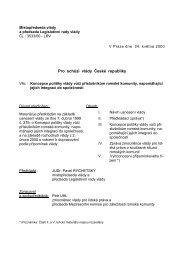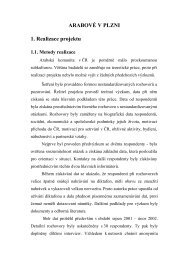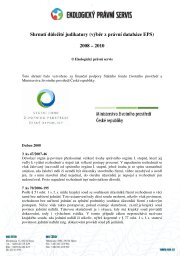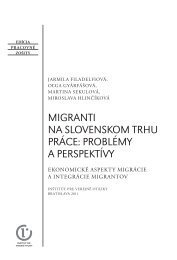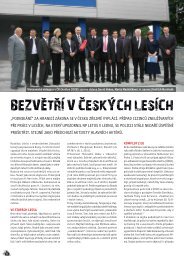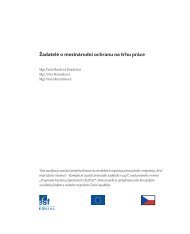Migration Processes in Central and Eastern Europe - Multiple Choices
Migration Processes in Central and Eastern Europe - Multiple Choices
Migration Processes in Central and Eastern Europe - Multiple Choices
Create successful ePaper yourself
Turn your PDF publications into a flip-book with our unique Google optimized e-Paper software.
———————————————————————————————————————————————————————————————<br />
<strong>Migration</strong> through Gender, Age <strong>and</strong> Class Perspectives<br />
———————————————————————————————————————————————————————————————<br />
44<br />
Yet, because of their work <strong>and</strong> f<strong>in</strong>ancial situation, they<br />
cannot afford to participate <strong>in</strong> local events to the degree to<br />
which the elderly Germans do <strong>and</strong> consume personal care<br />
services only rarely. On the other h<strong>and</strong>, the nature of their<br />
work makes them look for customers among either foreigners<br />
liv<strong>in</strong>g <strong>in</strong> Hungary or other non-Hungarians liv<strong>in</strong>g abroad.<br />
In this way, they are often more <strong>in</strong>tegrated with the foreign<br />
population <strong>in</strong> the region than the elderly group.<br />
Another po<strong>in</strong>t of divergence between the experiences<br />
of retirees <strong>and</strong> labour migrants arises from the way<br />
that locals perceive them. Compared to many labour<br />
migrants, the retirees are not seen as a threat to the saturated<br />
labour market. On the contrary, German retirees are often<br />
welcomed as potential employers, s<strong>in</strong>ce they usually<br />
employ local people for renovation, ma<strong>in</strong>tenance work or<br />
garden<strong>in</strong>g. In this respect, the experiences of the middle-aged<br />
German migrants are rather similar to their elderly mates.<br />
Although the local youth face serious unemployment <strong>in</strong><br />
the region, they usually do not perceive the middle-aged<br />
German settlers to be endanger<strong>in</strong>g their position. In fact,<br />
the work of the self employed Germans fills <strong>in</strong> a gap<br />
<strong>in</strong> local services (i.e. respond<strong>in</strong>g to the needs of the new<br />
foreign population). For example, <strong>in</strong> smaller towns or villages<br />
hardly any services or <strong>in</strong>formation are available <strong>in</strong> foreign<br />
languages.<br />
Language is reported to pose the greatest difficulty<br />
<strong>in</strong> the lives of the new settlers, as none of my <strong>in</strong>terviewees<br />
spoke Hungarian, <strong>and</strong> only a few people among the local<br />
Hungarians speak a foreign language. This poses difficulties<br />
especially <strong>in</strong> relation to adm<strong>in</strong>istrative issues, as an elderly<br />
<strong>in</strong>formant expla<strong>in</strong>ed:<br />
It's really hard to learn about our rights, or get<br />
anyth<strong>in</strong>g adm<strong>in</strong>istrative arranged. One has to go after<br />
everyth<strong>in</strong>g to learn about our rights <strong>and</strong> possibilities.<br />
But the language is the biggest problem, people do<br />
not speak German. Not even <strong>in</strong> offices. So I usually<br />
ask P. who is a Hungarian who speaks German, to<br />
come with me <strong>and</strong> help, when I need to settle some<br />
adm<strong>in</strong>istrative matter.<br />
Although many elderly Germans try to learn<br />
Hungarian, it proves to be difficult at their advanced age.<br />
The situation is similar for the middle-aged; their<br />
Hungarian also rema<strong>in</strong>s at a very basic level because they<br />
usually only have contact with other foreigners.<br />
Another problem that arises from the specific age<br />
structure of the migrants is the possible worsen<strong>in</strong>g of their<br />
health or the death of a spouse. German migrants are<br />
sett<strong>in</strong>g up new homes a long distance away from their<br />
relatives; this makes regular care by their children hard<br />
or even impossible. Although none of my <strong>in</strong>formants<br />
reported a worsen<strong>in</strong>g of their health condition, I have been<br />
told of several cases <strong>in</strong> which a person's spouse had died<br />
dur<strong>in</strong>g their residence <strong>in</strong> Hungary. In each case, the<br />
widow/er rema<strong>in</strong>ed <strong>in</strong> Hungary <strong>in</strong> spite of the obvious<br />
difficulties that accompany liv<strong>in</strong>g alone <strong>in</strong> a foreign country<br />
at an older age, where language problems severely limit the<br />
number of people with whom one can communicate. One<br />
possible reason for this is that the large amount of money<br />
that the foreigners have <strong>in</strong>vested <strong>in</strong> the renovation of their<br />
Hungarian homes, which could not be converted back to<br />
cash without a large loss of <strong>in</strong>vestment due to low hous<strong>in</strong>g<br />
prices <strong>in</strong> the small villages. As an <strong>in</strong>formant whose spouse<br />
died two years ago put it:<br />
No, I did not th<strong>in</strong>k about go<strong>in</strong>g back. Here is this<br />
big house, fully equipped. I have friends here, my<br />
neighbours are good, <strong>and</strong> I have my husb<strong>and</strong> buried<br />
here. And what would be there for me <strong>in</strong> Germany?!<br />
I could not obta<strong>in</strong> a house there from my money.<br />
The social status of the migrants appears to be connected<br />
to the age structure. The elderly receive a constant high<br />
<strong>in</strong>come, <strong>and</strong> can therefore have a more affluent lifestyle<br />
than the younger self-employed people. Due to the relocation<br />
of their practices, the German elderly migrants actually<br />
experience a considerable <strong>in</strong>crease <strong>in</strong> their social status.<br />
They were previously part of an extensive lower middle<br />
class <strong>in</strong> Germany <strong>and</strong> most were unable to own a flat or<br />
a house. But <strong>in</strong> their new liv<strong>in</strong>g environment, they appear<br />
as well-established wealthy people who can afford to buy<br />
almost anyth<strong>in</strong>g. They own large houses, which are fully<br />
equipped <strong>and</strong> luxuriously renovated, <strong>and</strong> they consume<br />
goods <strong>and</strong> services that most locals can rarely afford.<br />
Thus, they experience a considerable <strong>in</strong>crease<br />
<strong>in</strong> status when compared with their previous situation,<br />
<strong>and</strong> this new status is quite high <strong>in</strong> comparison with most<br />
locals. Such a difference <strong>in</strong> social status is also apparent<br />
<strong>in</strong> terms of hous<strong>in</strong>g <strong>and</strong> lifestyle. German migrants live <strong>in</strong><br />
luxurious houses, which st<strong>and</strong> out among the homes of<br />
the locals, which tend to be <strong>in</strong> a very bad condition. The<br />
younger locals are often unemployed <strong>and</strong> live off social<br />
assistance. The local elderly also live a much more modest<br />
life compared to their German counterparts. This can be<br />
best demonstrated by the difference <strong>in</strong> the amount of their<br />
pensions. While the m<strong>in</strong>imum pension <strong>in</strong> Germany is six<br />
hundred Euros, <strong>in</strong> Hungary it is only around two hundred.<br />
This enormous difference <strong>in</strong> <strong>in</strong>come often leads to a negative<br />
perception of new settlers by local <strong>in</strong>habitants, who<br />
often perceive the foreigners as show<strong>in</strong>g off <strong>and</strong> as be<strong>in</strong>g<br />
<strong>in</strong>considerate because they can afford to pay for anyth<strong>in</strong>g.<br />
In this respect, the social status of the German selfemployed<br />
people is much nearer to that of the locals. They<br />
do not have money for luxurious houses <strong>and</strong> live similar<br />
lifestyles to the local people of their age.<br />
<strong>Migration</strong> <strong>Processes</strong> <strong>in</strong> <strong>Central</strong> <strong>and</strong> <strong>Eastern</strong> <strong>Europe</strong>: Unpack<strong>in</strong>g the Diversity


